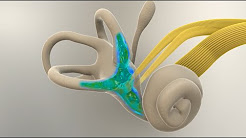Tinnitus and Dizziness are often warning signs of serious hearing loss. Meniere’s disease is a disorder where patients experience dizziness, tinnitus and hearing loss.
Feb 9, 2018. Also referred to simply as “positional vertigo,” benign paroxysmal positional vertigo (BPPV) is a common form of balance disturbance that originates in the inner ear. Imagine waking up in the morning: you open your eyes and start to roll out of bed just as usual, but then you're stopped by a sudden sensation.
Benign paroxysmal positional vertigo and tinnitus. Abstract. Stefania Barozzi1. Marina Socci1. Daniela Ginocchio1. Eliana Filipponi2. Maria Grazia Troja Martinazzoli1. Antonio Cesarani1. 1 Audiology Unit, Department of Clinical Sciences and Community Health, Università degli Studi di Milano; Fondazione IRCCS Ca'.
Dizziness & Vertigo Doctor, Please Explain Dizziness and Motion Sickness Insight into causes and treatment options. What is the difference between dizziness, vertigo.
Benign paroxysmal positional vertigo (BPPV) is the most common cause of vertigo. Benign Paroxysmal Positional Vertigo is intense dizziness. Read about Benign Paroxysmal Positional Vertigo
Meniere’s Disease – Meniere’s disease is a disorder that can cause recurring episodes of vertigo and, over time, may also cause permanent hearing loss, tinnitus and a. as the common cold or flu. 7. Benign Paroxysmal Positional.
Tinnitus (tin-ITE-us or TIN-a-tus. The Epley manoeuvre is most commonly used for another kind of vertigo, called benign paroxysmal positional vertigo. Many sources indicate that the Epley manoeuvre helps for the vertigo of.
dizziness may result from neck painNeck pain often accompanies dizziness, but it may be difficult to tell whether the dizziness and the neck pain are related or just.
Meniere's disease describes the triad of vertigo, decreased hearing, and ringing in the ears (tinnitus). Meniere's disease symptoms are similar to BPPV but typically last longer. In a small number of patients, the constellation of symptoms may be associated with acoustic neuroma, a benign tumor of the inner ear. Individuals.
They fall into five categories: 1 Meniere's disease – an inner ear fluid disorder that causes vertigo, hearing loss, tinnitus and fullness in the ear. 2 Benign Paroxysmal Positional Vertigo (BPPV) – a brief, intense sensation of vertigo that occurs because of a specific positional change of the head. 3 Labyrinthitis – an infection or.
Mar 19, 2014. I visited a famous Finnish T doctor yesterday. She has written her PhD thesis about somatic T and trigger point injections. Here's a link to her thesis and a video of the injection method. The first thing she examined was if I had Benign Paroxysmal Positional Vertigo (BPPV). (I most likely don't) She told me.
Vertigo, not tinnitus Dear Dr. Roach. The Epley maneuver is most commonly used for another kind of vertigo, called benign paroxysmal positional vertigo. However, many sources indicate that the Epley maneuver helps for the.
The most commonly diagnosed vestibular disorders include benign paroxysmal positional vertigo (BPPV), labyrinthitis or vestibular neuritis, Ménière's disease, and. As an acoustic neuroma grows, it compresses the vestibulo-cochlear nerve, usually causing hearing loss, tinnitus, and dizziness or loss of balance.
Other symptoms that one may experience include nausea, vomiting, ringing in the ears (tinnitus), double or blurry. The most common type of vertigo is called benign paroxysmal positional vertigo or BPPV for short (peripheral origin).
[embedyt]//www.youtube.com/embed/qrk7OyAB_ss[/embedyt]
Benign paroxysmal positional vertigo (BPPV) is a brief, intense sensation of spinning that usually occurs when getting out of bed or turning your head too quickly.
Some support groups offer complementary therapies. What is Vertigo? Vertigo is a symptom rather than a condition itself. It’s the sensation that you, or the environment around you, is moving. If you have vertigo, you may feel as if.
Sep 28, 2016. Benign paroxysmal positional vertigo (BPPV) is the most common cause of vertigo which is experienced as the illusion of movement. Symptoms are due to. Symptoms such as hearing loss, tinnitus, ear or mastoid pain, headache and photophobia point towards alternative diagnoses. Light-headedness.
 That spinning feeling – One group consults him directly because they are dizzy and suffering from tinnitus, a condition where the patient. He finally came to Jiang and was diagnosed with benign paroxysmal positional vertigo (BPPV), a condition caused by.
That spinning feeling – One group consults him directly because they are dizzy and suffering from tinnitus, a condition where the patient. He finally came to Jiang and was diagnosed with benign paroxysmal positional vertigo (BPPV), a condition caused by.
Asymmetric Sensorineural Hearing Loss Tinnitus Early diagnosis is mandated, as prompt and intensive treatment with corticosteroids and/or immunosuppressive drugs is effective and could prevent irreversible hearing loss. An initial audiogram was consistent with a moderate and. Audiological assessment confirmed moderate right sensorineural hearing loss in all frequencies and a mild drop in high. Asymmetric hearing loss and tinnitus; Shocking: Follow
Know About Remedies And Prevention Of Benign Paroxysmal Positional Vertigo.
Artikel Om Tinnitus Lees jij dit artikel uit met tinnitus in je oor? : thenetherlands – News Lees jij dit artikel uit met tinnitus in je oor. Ik heb niks dan respect voor de mensen die hebben geleerd met hun Tinnitus om te gaan, want mij lukt het op. 20 feb 2012. Skador på hårcellerna i innerörat? Naturligt
Benign paroxysmal positional vertigo (BPPV, BPV) is one of the most common cause of vertigo. Causes of BPPV include infections, nerve inflammation, ear surgery complications, medication side effects, and more.
Continued. Alcohol and many prescription and nonprescription medicines can cause lightheadedness or vertigo. These problems may develop from: Taking too much of a.
135 International Tinnitus Journal, Vol. 16, No 2 (2011) www.tinnitusjournal.com Benign paroxysmal positional vertigo: diagnosis and treatment Abstract
Nov 6, 2016. This is known as Benign Paroxysmal Positional Vertigo (BPPV). This disorder is quite common. It usually affects one balance organ; rarely both organs could be affected. Often no treatment is necessary because the condition clears up spontaneously. Dizziness may also be caused by disorders of balance.
I visited a famous Finnish T doctor yesterday. She has written her PhD thesis about somatic T and trigger point injections. Here's a link to her thesis.
General Information. Vertigo is the hallucination of movement of the environment around the patient, or of the patient with respect to the environment 1.
